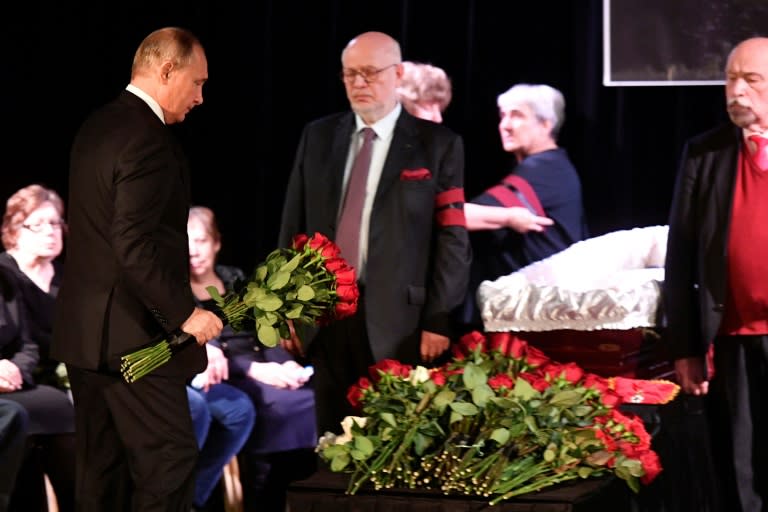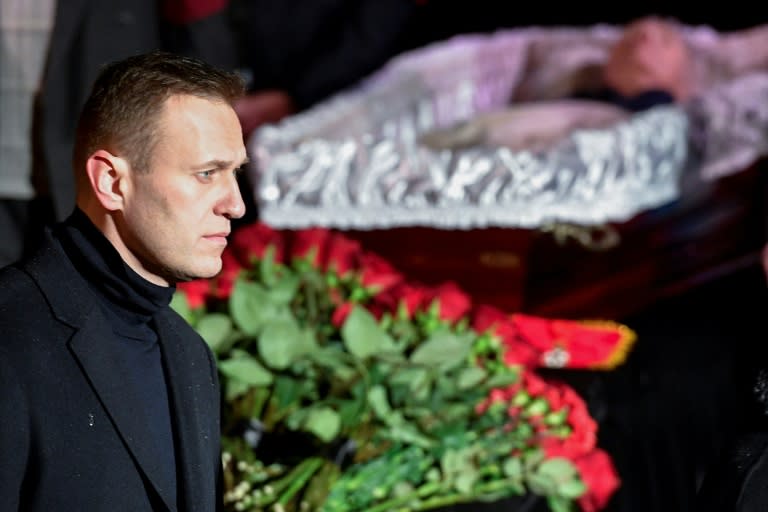Russians mourn human rights icon Alexeyeva
Russians paid their last respects to human rights icon Lyudmila Alexeyeva on Tuesday, with some mourners angered by President Vladimir Putin's attendance of a memorial ceremony. The Russian leader, who critics accuse of overseeing a rise in repression over his nearly two decades in power, sat briefly by Alexeyeva's body and spoke to her family in the grand hall where mourners laid dozens of flowers. Supporters said Putin's attendance was only natural and showed Alexeyeva's ability to win respect from even those she criticised. But others seethed at the presence of the Russian leader. "He probably wants to look humane. But it looks disgusting with what's happening in the country," said opposition politician Dmitry Gudkov, who queued to bid farewell to Alexeyeva. The veteran activist died on Saturday at the age of 91 after an extraordinary seven-decade career that saw her promote human rights during the Soviet era and in modern Russia. Prominent opposition figures and ordinary Russians queued in the snow to get into the memorial ceremony at Moscow's Central House of Journalists. They laid flowers at the foot of her open casket, where Alexeyeva's body was lying beneath a portrait of the activist. Many were angered ahead of the ceremony when a Moscow court denied Alexeyeva's 77-year-old colleague Lev Ponomaryov -- currently serving a 16-day jail sentence for calling for protests -- permission to attend the memorial. Security was tight for the ceremony, with riot police lining the streets and mourners having to pass through metal detectors. - 'Unbiased sense of justice' - Doctoral student Alexander Sharov said he had come to pay his respects to an activist who had an "unbiased sense of justice and clarity of thought". He said Putin had only appeared because he wanted to appear "civilised". But Russia's Commissioner for Human Rights Tatyana Moskalkova said Putin's presence showed activists can be successful in cooperating with authorities. "It was amazing how she was able to have a dialogue with the authorities and with her opponents," Moskalkova said. "She aimed for compromise in the name of results." Opposition activist Anna Krechetova said she was not put off by Putin's presence. "I think that if we cooperate with authorities it should be to get people out of jail," she told AFP. Some visitors wore T-shirts bearing slogans in support of activists serving prison sentences in Russia, including for Oyub Titiev -- a rights campaigner detained in Chechnya. Prominent activist Svetlana Gannushkina read out a note with condolences that Titiev wrote from prison. - 'Knew how to find compromises' - Later in the day Putin unveiled a statue of the late Soviet dissident Alexander Solzhenitsyn, as part of celebrations to mark the centenary of his birth. Putin also chaired a meeting of Russia's Presidential Human Rights Council, which Alexeyeva was a part of, where he held a minute of silence and praised her willingness to work with authorities. "She knew how to find compromises," Putin told the council. "There are ways to find compromises within the law if you have the will to do so." Alexeyeva was the leader of the Moscow Helsinki Group, one of Russia's oldest rights organisations which she helped found in 1976. In the Soviet era, she campaigned against trials for dissidents and endured numerous searches and interrogations at the hands of the KGB. Alexeyeva continued to campaign for human rights in modern Russia, refusing to register the Moscow Helsinki Group as a "foreign agent" as required by a 2012 law. Putin began what has been described as a major crackdown on civil society that year, after thousands of Russians took to the streets to protest his return to the Kremlin after four years as prime minister. Alexeyeva slammed Moscow's seizure of Crimea from Ukraine in 2014 for "bringing shame on my country". The activist died in a Moscow hospital on Saturday after a long illness. She was cremated at Moscow's Troyekurovskoye Cemetery and part of her ashes will be spread in the United States, where she lived for 16 years after fleeing the Soviet Union in 1977.





